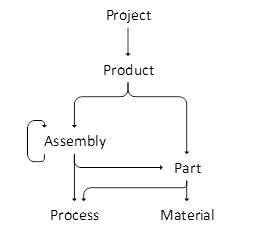Base Solution Interface Documentation
The base solution provides all the necessary definitions and information, such as:
- Available resources / resource structure
- Properties and their domain types (visible when entering the property name)
- Extension points of "Details" view
Where can I find the Base Solution Interface file?
C:\Program Files\FACTON\FACTON EPC Solution Development Environment\PlatformSolutions
How can I exchange the base solution?
-
Select the cost model "
TableModel" in "My Local Configuration".
The Item Details view opens below.
Here you will see the Base Solution Name and Base Solution Version.
-
Click on [...] next to the base solution name to select a different version.
-
Navigate to "C:\Program Files\FACTON\FACTON EPC Solution Development Environment\PlatformSolutions".
-
Select the base solution.
The base solution version changes according to the selected file.
Base Solution properties can be recognized by gray symbols ( ).
-
Shows the name of the base solution on which the respective cost model is based. For the "TableModel" cost model it is the "Facton.Solutions.Samples.Base.Core" which was installed with the FACTON CMD.
NoteThe file name ("Facton.Solutions.Samples.Base.Core.22.1.XXXXX.costModelInterface") is a concatenation of the actual name of the solution and its version.
-
Shows the version number of the base solution. This can be the exact version (as in the package file name, see above). It is possible to define version ranges using the NuGet syntax (versioning notations for intervals).
Example[1.0,2.0), which means 1.0 ≤ x < 2.0.
Further Information see Version ranges.
Basic Concept – Cost Calculation
The following resources are available under a "Project" calculation:
- Product
- Assembly
- Material
- Part
- Process
Some resources have interface properties which can be overridden by a cost model. To determine the Costs in the Base Solution the following formula is used across the board:
Provides ProductionCost [Money, Structural] =
DirectMaterialCost + DirectManufacturingCost;
The DirectMaterialCost will be determined at the "Material" resource using its "Volume" where as the DirectManufacturingCost depends on the "Cycle Time" of the "Process".
Resource Structure / Resource Allocation
The resources can be allocated in the following way under a "Project" calculation:

Resource Interface Properties
The Base Solution provides some interface properties which can be set by a cost model.
| Target Resource | Domain Type | Interface Property | Domain Type |
|---|---|---|---|
| Product | Piece | ManufacturingCostRate
|
Money/Time
|
| Assembly | Piece | RelevantQuantity
|
ResourceQuantityType
|
| Material | Volume | ShapeVolume
|
Volume
|
MaterialShapeExtensionPoint
|
ExtensionOf(MaterialShapeExtensionType)
|
||
MaterialClassification
|
TMaterialClassification
|
||
| Part | Piece | RelevantQuantity
|
ResourceQuantityType
|
| Process | Cycle | ExtProcessCycleTime
|
Time/ResourceQuantityType
|
Calculating Shape Specific Material Volume
If you want to calculate the material volume based on a predefined shape you can do this if you set the corresponding extension for the "MaterialShapeExtensionPoint" property at the "Material:
| Shape | Material Shape Extension | Interface Property | Domain Type |
|---|---|---|---|
| Cube | CubeShape | ExtSideLength
|
Length
|
| Cuboid | CuboidShape | ExtSideA
|
Length
|
ExtSideB
|
Length
|
||
ExtSideC
|
Length
|
||
| Pyramid | PyramidShape | ExtSideCount
|
Integer
|
ExtHeight
|
Length
|
||
ExtSideLength
|
Length
|
||
| Sphere | SphereShape | ExtRadius
|
Length
|

Extension points of "Details" view
Each resource provides a "Details" view extension point for easy cost model integration. The detail view extension points follow a simple naming scheme:
"CostModel-[Resource]-[Target ViewSchema]"
Currently there is only the “Default” view schema supported.
To add new properties to the "Material" detail view simply reference it as follows:
CostModel-Material-Default
More extension point names for the "Details" view for each available resource in the base solution.
| Target Resource | Detail View Extension Name |
|---|---|
| Product | CostModel-Product-Default |
| Assembly | CostModel-Assembly-Default |
| Material | CostModel-Material-Default |
| Part | CostModel-Part-Default |
| Process | CostModel-Process-Default |